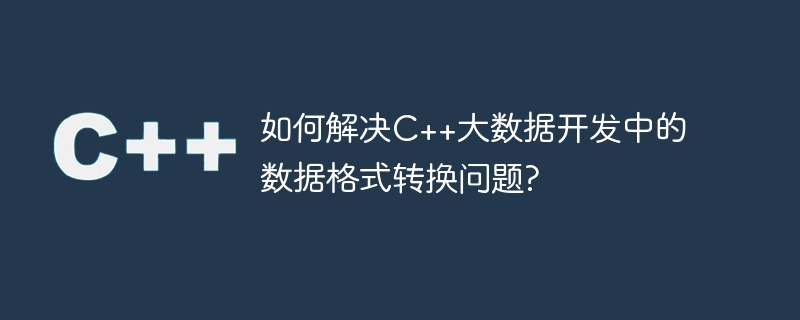

How to solve the data format conversion problem in C big data development?
In C big data development, data format conversion is a common problem. Conversion between different data formats requires some specific processing steps. This article will introduce some common data format conversion problems and provide corresponding solutions.
In the process of big data processing, it is often necessary to convert strings into numeric types for calculation. In C, you can use the standard library functions stoi and stof to convert strings to integers and floating point types.
#include <iostream>
#include <string>
int main() {
std::string str = "123";
int num = std::stoi(str);
std::cout << "转换后的数字为:" << num << std::endl;
std::string strFloat = "3.14";
float f = std::stof(strFloat);
std::cout << "转换后的浮点数为:" << f << std::endl;
return 0;
}Contrary to converting string to number, sometimes you need to convert numbers to string type. In C, you can use the std::to_string function to convert integers and floating point types into strings.
#include <iostream>
#include <string>
int main() {
int num = 123;
std::string str = std::to_string(num);
std::cout << "转换后的字符串为:" << str << std::endl;
float f = 3.14;
std::string strFloat = std::to_string(f);
std::cout << "转换后的字符串为:" << strFloat << std::endl;
return 0;
}In C development, conversion between strings and character arrays is also a common problem. You can use the strcpy function to copy a string into a character array, and use the string member function c_str() to convert a string into a character array.
#include <iostream>
#include <string>
#include <cstring>
int main() {
std::string str = "hello";
char charArray[10];
std::strcpy(charArray, str.c_str());
std::cout << "转换后的字符数组为:" << charArray << std::endl;
char charArray2[10] = "world";
std::string str2(charArray2);
std::cout << "转换后的字符串为:" << str2 << std::endl;
return 0;
}In big data development, the conversion between timestamp and date and time is also a common problem. You can use the ctime library function to convert a timestamp into a date time, and the strftime function to convert a date time into a custom formatted string.
#include <iostream>
#include <ctime>
int main() {
std::time_t timestamp = std::time(nullptr);
std::cout << "当前时间戳为:" << timestamp << std::endl;
std::tm* timeinfo = std::localtime(×tamp);
char buffer[80];
std::strftime(buffer, 80, "%Y-%m-%d %H:%M:%S", timeinfo);
std::cout << "当前日期时间为:" << buffer << std::endl;
return 0;
}The above are several common data format conversion problems and corresponding solutions. In actual development, we will also encounter more complex and specific conversion requirements, which require corresponding processing and conversion based on specific circumstances.
To summarize, data format conversion is a common problem in C big data development, but there are many ready-made solutions available. Mastering these conversion skills can process and convert different data formats more efficiently and improve the efficiency of big data development.
The above is the detailed content of How to solve the data format conversion problem in C++ big data development?. For more information, please follow other related articles on the PHP Chinese website!




